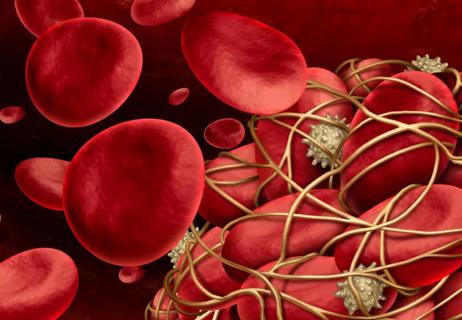Multi-site study reveals surprising findings

Von Willebrand disease (VWD) is the most common inherited bleeding disorder in the world, and heavy menstrual bleeding affects as many as 80% of women and girls with the condition. Yet there is no consensus on the optimal treatment approach. Now a new multi-institution study compares two treatment options.
Advertisement
Cleveland Clinic is a non-profit academic medical center. Advertising on our site helps support our mission. We do not endorse non-Cleveland Clinic products or services. Policy
The study looked at recombinant Von Willebrand factor, which works by replacing deficient Von Willebrand protein and has been shown to safely reduce bleeds in patients but has not been studied in treating heavy menstrual bleeding specifically. It was compared against tranexamic acid, an anti-fibrinolytic medication that’s one of the standard non-hormonal treatments for VWD.
“The hypothesis of the trial designers was that the recombinant Von Willebrand may be better, but actually the results were the opposite,” says Dana Angelini, MD, a physician in Cleveland Clinic’s Hematology and Medical Oncology department and a coauthor on the study. Researchers found that tranexamic acid was significantly more effective at controlling heavy menstrual bleeding. It also reduced the frequency of flooding reported by participating women. There was no difference between the two treatments when it came to cycle severity, cycle length and reported quality of life.
The paper, “Multicenter, Randomized Crossover Trial Comparing Recombinant Von Willebrand Factor and Tranexamic Acid for Heavy Menstrual Bleeding in Von Willebrand Disease,” was presented at the 2022 American Society of Hematology meeting. Cleveland Clinic participated in the study, which was designed by researchers at the University of Pittsburgh.
Dr. Angelini noted that there is an unmet need for better treatments for VWD, and the issue of menses in particular is under studied. Some treatments are not well tolerated by patients, while others that involve the use of contraceptives may not be an option for patients trying to get pregnant. “Outside of oral hormonal treatment, there really isn’t a standard of how to approach heavy menstrual bleeding in these patients,” she says.
Advertisement
For the randomized, crossover study, 36 women with VWD were split into two groups. Half received tranexamic acid, while the other half received recombinant VWF. After two cycles, patients switched to the other treatment.
Each woman kept a diary to record their flow and other symptoms, using a pictorial blood assessment chart to measure their flow. “Even with Von Willebrand disease, menstrual flow varies so much from woman to woman, so using each woman as her own control allowed researchers to assess the outcomes with better clarity,” says Dr. Angelini.
“Having data in this field is great, no matter what the result,” Angelini says. “This was a good trial that helped answer an important question, and the results can help guide treatment decisions when physicians are talking through options with patients.”
Advertisement
Advertisement

The relationship between MTHFR variants and thrombosis risk is a complex issue, but current evidence points to no association between the most common variants and an elevated risk

Pinpointing how tumors reprogram platelets and trigger blood clots

IV thrombolysis should not be delayed because of planned thrombectomy

Aim is for use with clinician oversight to make screening safer and more efficient

Alzheimer’s studies delve into sex-related variances in the expression of the disease

Approximately 500 million people globally are experiencing 'period poverty'

Findings help close the knowledge gap around VTE practice patterns

Confounding symptoms and a complex medical history prove diagnostically challenging